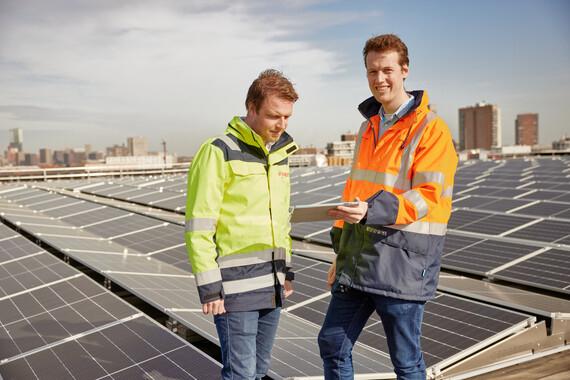We aim to be a circular company by 2050
Circularity is one of the pillars of Eneco's One Planet plan. A circular economy plays an important role in reducing CO2 emissions and thus climate change. Based on the principle of 'waste no more', natural resources are no longer exhausted in a circular economy. We achieve this by producing in a different way. As little use of raw materials as possible and reuse of materials. Managing for circularity also means taking responsibility for respecting human rights. Because practice shows that where raw materials are scarce, there is pressure on the environment and human rights are at risk.

Circularity is one of the pillars of Eneco's One Planet plan
In the energy sector, circularity is an important theme. The demand for metals and minerals related to low-carbon technologies (wind, solar, and others) is too high. Its global production and availability cannot keep up with the pace needed to combat climate change.On top of that, the supply chains for metals and minerals unfortunately contain CSR risks, including in the area of human rights and working conditions, which we need to address. Eneco feels and takes responsibility and wants to be a circular company by 2050. Society and the companies with which we do business also expect this of us.
Dependencies
Circularity means being active in and taking responsibility for the chain. This is a complex process with many dependencies. Although 2050 is the dot on the horizon, we have set intermediate targets in order to improve and achieve results even before that time.For example, by 2023 we want to be able to manage the inflow and outflow of materials from wind, solar and heat in accordance with our circular principles. We aim for 25% of our high impact areas wind, solar and heat to be circular by 2025. The ambition to be a circular company by 2050 is in line with the Dutch government programme 'Circular Economy 2050'.
Circularity actions
We will achieve our goal of becoming a circular company by 2050 with three actions:
- Circularity: We want the share of materials in the life cycle of products and assets that comply with circular principles to increase. We focus on the inflow and outflow of materials in the life cycle of products and assets in the high impact areas wind, solar and heat.
- Sustainable procurement: We encourage the CSR performance of our suppliers through a supplier code of conduct, CSR criteria in contracts, supplier assessments and development and resource passports.
Roadmap circularity
On the road to 2050, we have set a number of intermediate targets that will help us reach the final goal of full circularity and that will allow us to realise improvements in our value chains even before that time:
- By 2021, we have a methodology to account for material depletion and the environmental impact of our business cases for new assets based on LCA (Life Cycle Analysis).
- By 2022, we have implemented the due diligence process and associated governance (management) structure in the organisation.
- By 2023, we are able to manage the inflow and outflow of materials from wind, solar and heat in line with our circular principles.
- From 2023 onwards we are able to manage the reduction of CSR risks in the value chains related to wind, solar and heat.
- By 2025, we will have demonstrably mitigated a number of prioritised CSR risks relating to wind, solar or heat.
- By 2025, 25% of our high impact areas wind, solar and heat are circular.
- By 2050 we will be a circular company.